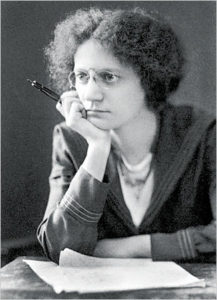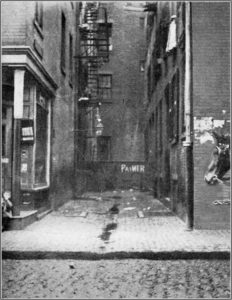Mary Antin’s memoir The Promised Land deals with her life as a child and young adult in America after immigrating from Belarus in the 1890s. Her father had come to Boston a few years earlier, and was finally able to send for his wife and four children in 1894.
In this excerpt, Antin describes her first days in America. As a 12-year-old just off the ship, she saw their poor neighborhood very differently than native Bostonians viewed it:
Anybody who knows Boston knows that the West and North Ends are the wrong ends of that city. They form the tenement district, or, in the newer phrase, the slums of Boston. Anybody who is acquainted with the slums of any American metropolis knows that that is the quarter where poor immigrants foregather, to live, for the most part, as unkempt, half-washed, toiling, unaspiring foreigners; pitiful in the eyes of social missionaries, the despair of boards of health, the hope of ward politicians, the touchstone of American democracy…
He may know all this and yet not guess how Wall Street, in the West End, appears in the eyes of a little immigrant from Polotzk. What would the sophisticated sight-seer say about Union Place, off Wall Street, where my new home waited for me? He would say that it is no place at all, but a short box of an alley. Two rows of three-story tenements are its sides, a stingy strip of sky is its lid, a littered pavement is the floor, and a narrow mouth its exit.
But I saw a very different picture on my introduction to Union Place. I saw two imposing rows of brick buildings, loftier than any dwelling I had ever lived in. Brick was even on the ground for me to tread on, instead of common earth or boards. Many friendly windows stood open, filled with uncovered heads of women and children. I thought the people were interested in us, which was very neighborly. I looked up to the topmost row of windows, and my eyes were filled with the May blue of an American sky!…
The three small rooms into which my father now ushered us, up one flight of stairs, contained only the necessary beds, with lean mattresses; a few wooden chairs; a table or two; a mysterious iron structure, which later turned out to be a stove; a couple of unornamental kerosene lamps; and a scanty array of cooking-utensils and crockery. And yet we were all impressed with our new home and its furniture. It was not only because we had just passed through our seven lean years, cooking in earthen vessels, eating black bread on holidays and wearing cotton; it was chiefly because these wooden chairs and tin pans were Continue reading


